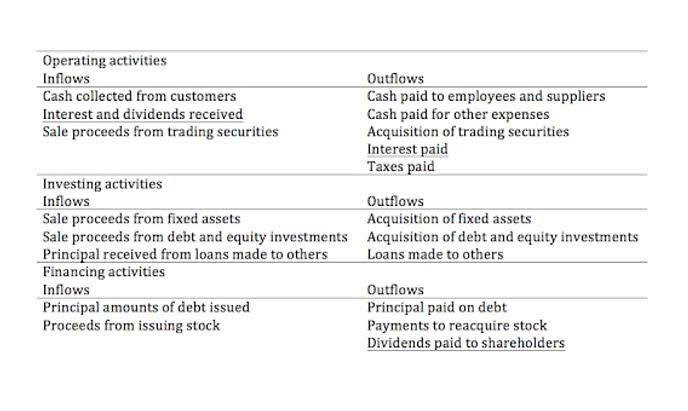What is an accountant? Definition and examples
Content

The act significantly raises criminal penalties for securities fraud, for destroying, altering or fabricating records in federal investigations or any scheme or attempt to defraud shareholders. The ACCA is the largest global accountancy body with over 320,000 members, and the organisation provides an ‘IFRS stream’ and a ‘UK stream’. Students must pass a total of 14 exams, which are arranged across three levels.

Double-entry systems add assets, liabilities, and equity to the organization’s financial tracking. Cash flow describes the balance of cash that moves into and out of a company during a specified accounting period.
How to Use This Accounting Terms Guide
Without accounting, investors would be unable to rely on timely or accurate financial information, and companies’ executives would lack the transparency needed to manage risks or plan projects. Regulators also rely on accountants for critical functions such as providing auditors’ opinions on companies’ annual 10-K filings.
Why is accounting important?
Accounting helps a business understand its financial position to be able to make informed decisions and manage risks.
Both versions of the term describe products or services sold to customers without receiving upfront payment. It is a more complete and accurate alternative to single-entry accounting, which records transactions only once. In corporate accounting, dividends represent portions of the company’s profits voluntarily paid out to investors. Investors are often paid in cash, but may also be issued stock, real property, or liquidation proceeds. In most cases, dividends follow a regular monthly, quarterly, or annual payment schedule. However, they can also be offered as exceptional one-time bonuses.
History Of Accounting In Nigeria
In some cases, management manipulated the figures shown in financial reports to indicate a better economic performance. In others, tax and regulatory incentives encouraged over-leveraging of companies and decisions to bear extraordinary and unjustified risk. Accounting has existed in various forms and levels of sophistication throughout human history. The double-entry accounting system in use today was developed in medieval Europe, particularly in Venice, and is usually attributed to the Italian mathematician and Franciscan friar Luca Pacioli.
- This also includes all profit and loss from any investments made in the company’s name.
- The first published work on a double-entry bookkeeping system was the Summa de arithmetica, published in Italy in 1494 by Luca Pacioli (the « Father of Accounting »).
- Double-entry bookkeeping was pioneered in the Jewish community of the early-medieval Middle East and was further refined in medieval Europe.
- James M. Tobin is a writer, researcher, and editor specializing in student reference and academic research materials related to technology, business, finance, law, and the humanities.
- Examples include bank loans, unpaid bills and invoices, debts to suppliers or vendors, and credit card or line of credit debts.
- With the development of joint-stock companies, accounting split into financial accounting and management accounting.
Accountants sometimes make future projections with respect to revenues, expenses, and debts. The concept of « present value » describes calculated adjustments that express those future funds in present-day dollars.
What Are the Responsibilities of an Accountant?
So, these are some of the critical points regarding accounting and accountancy. Both of them are responsible for keeping the financial transactions safe in the journals. Thus, both accounting and accountancy are significant aspects of effective management and decision-making of the firms. In the world of accounting, these professionals are the detectives. They gather and analyze financial records to determine whether they adhere to local and national laws and standards. When the police or a supervisory authority suspects fraud, they may send in a team of forensic accountants.
- Depending on its size, a company may be legally required to have their financial statements audited by a qualified auditor, and audits are usually carried out by accounting firms.
- Accrual basis accounting (or simply « accrual accounting ») records revenue- and expense-related items when they first occur.
- Investors are often paid in cash, but may also be issued stock, real property, or liquidation proceeds.
- Financial accounting is the process of recording, summarizing and reporting the myriad of a company’s transactions to provide an accurate picture of its financial position.
- They are the people you need to talk to if you want to determine how profitable your company is.
- Principle of Materiality — The value of all assets are set at cost, and all financial reports are based on the truth.
Auditing is the verification of assertions made by others regarding a payoff, and in the context of accounting it is the « unbiased examination and evaluation of the financial statements of an organization ». Audit is a professional service that is systematic and conventional. No medium or large business can function and compete effectively in the marketplace without an accountant or a team of them. They record and monitor a business’ or organizations’ flow of money. One whose profession includes organizing, maintaining and auditing the records of another. Clarify that other terms may be used within jurisdictions to refer to those meeeting the definition of professional accountant, and such terms may be based on local law or regulation. To develop an international definition of the term professional accountant.
What is a simple definition of accounting?
In March 2010, IFAC formed a task force comprised of a volunteer and a staff member from each of the boards and committees. The task force met on three occasions via teleconference and provided input to IFAC staff regarding the key issues that should be considered accountancy to assist staff in the development of this paper. The task force exchanged ideas through a series of informal discussion papers that noted various debates and perspectives. Through the outcomes of these discussions, IFAC staff developed a paper in January 2011.
- Accountants prepare or generate trial balances at the conclusion of a reporting period to ensure all accounts and balances add up properly.
- Public companies are required to issue periodic financial statements in compliance with GAAP or IFRS.
- Accountants may work as part of an accounting firm or exclusively for a large company.
- Financial statements are usually audited by accounting firms, and are prepared in accordance with generally accepted accounting principles .
- Cost accounting uses this same data to inform decisions related to the cost of producing specific products or services, right down to how they should be priced at the consumer level.
- The businesses are handled and managed effectively through accounting and accountancy.
Working capital defines the sum that remains after subtracting current liabilities from current assets. Equity capital specifies the money paid into a business by investors in exchange for stock in the company. Debt capital covers money obtained through credit instruments such as loans. Accounts receivable are sometimes called « trade receivables. » In most cases, accounts receivable derive from products or services supplied on credit or without an upfront payment. Financial accounting is the process of recording, summarizing and reporting the myriad of a company’s transactions to provide an accurate picture of its financial position. The difference between these two accounting methods is the treatment of accruals.
Chart of Accounts
Accounting can be divided into several fields including financial accounting, management accounting, tax accounting and cost accounting. Management accounting focuses on the measurement, analysis and reporting of information for internal use by management. The recording of financial transactions, so that summaries of the financials may be presented in financial reports, is known as bookkeeping, of which double-entry bookkeeping is the most common system. Accounting information systems are designed to support accounting functions and related activities.
FASB seeks input on proposed changes to accounting for joint … – Journal of Accountancy
FASB seeks input on proposed changes to accounting for joint ….
Posted: Thu, 27 Oct 2022 07:00:00 GMT [source]






